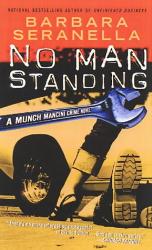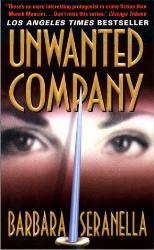Ali: | Welcome to Shots eZINE Barbara!
|
Barbara: | Thanks for having me.
|
Ali: | For our British readers, could you tell us what your past brought to your writing?
|
Barbara: |
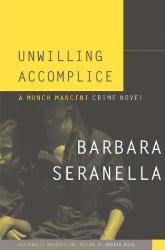 I ran away from home when I was 14 and went to live in the Haight-Ashbury district of San Francisco. It was 1971 and I wanted to be a part of the hippie movement before it was all over. Janis Joplin and Jimi Hendrix had died within months of each other and I had this feeling that if I didnít get out there soon I would miss it all. I was also unhappy at home, had begun using drugs, and hated school. Not to mention that puberty hit me hard.
Anyway, I joined a commune, got into harder and harder drugs, finding heroin and falling in love with it on my seventeenth birthday. In 1974, I took up with outlaw bikers as a sort of forced aversion program to get off heroin. It worked for a while. I got a job at a gas station working on cars and was maintaining an apartment and having some wild weekends. Then I got in a very bad motorcycle wreck. My front teeth were knocked out, my jaw was broken in four places and had to be wired shut for 10 weeks. I decided the biker lifestyle was too rough and went back to heroin. After numerous arrests, odís, and other near death experiences, I finally got my ass locked up long enough to realize I wasnít dying, things were just getting worse, and something needed to change. I got sober five days before I turned 22 and have been sober ever since. Twenty-six years this April.
I ran away from home when I was 14 and went to live in the Haight-Ashbury district of San Francisco. It was 1971 and I wanted to be a part of the hippie movement before it was all over. Janis Joplin and Jimi Hendrix had died within months of each other and I had this feeling that if I didnít get out there soon I would miss it all. I was also unhappy at home, had begun using drugs, and hated school. Not to mention that puberty hit me hard.
Anyway, I joined a commune, got into harder and harder drugs, finding heroin and falling in love with it on my seventeenth birthday. In 1974, I took up with outlaw bikers as a sort of forced aversion program to get off heroin. It worked for a while. I got a job at a gas station working on cars and was maintaining an apartment and having some wild weekends. Then I got in a very bad motorcycle wreck. My front teeth were knocked out, my jaw was broken in four places and had to be wired shut for 10 weeks. I decided the biker lifestyle was too rough and went back to heroin. After numerous arrests, odís, and other near death experiences, I finally got my ass locked up long enough to realize I wasnít dying, things were just getting worse, and something needed to change. I got sober five days before I turned 22 and have been sober ever since. Twenty-six years this April.
|
Ali: | And the prison time? Did it give you time to reflect on your life?
|
Barbara: | Absolutely, especially without my fellow addicts who helped me justify my using, and without being stoned I realized I had nothing going for me. I was toothless, diseased, unemployable, untrustworthy and my own brothers were waiting for me to die. I turned to God. Not any formal religious sort of God, but a Higher Power who could give me strength.
|
Ali: | So during this time, were you a reader? And did you follow the crime/mystery genre?
|
Barbara: | I read a book a day in jail. Iíve read all my life. In fact, I knew I wanted to be a writer since reading my first chapter book as a little girl and getting transported to another world. I never really read with an emphasis on crime and mystery. I was already experiencing the real deal. I read for escape and to be introduced to a world I would have no access to otherwise. In jail, the inmates (males especially) devour the soap operas. Beautiful, rich, white people with lots of time on their hands and all the trouble they get themselves into is a very exotic topic for most felons. I used to enjoy historical, multi-generational tomes, such as The Thornbirds and the Michener books.
|
Ali: | So where did the motor engineering expertise come from?
|
Barbara: | I learned how to be a mechanic while living at the commune and just stuck with it. When I quit wrenching to write, I had been a mechanic for twenty years.
|
Ali: | I read that it was really your husband Ron that encouraged you to take up the pen. What had you written before the Munch Mancini books?
|
Barbara: | I wrote some short stories. I even had one published in Easy Rider Magazine in 1975. My moniker as Crazy Barbara. After that, I wrote short vignettes for Readerís Digest, but they never published any of them. I wrote three books that I never published prior to writing the Munch books.
|
Ali: | What did those books teach you in terms of craft?
|
Barbara: |
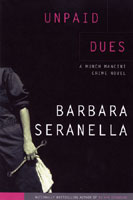
I learned that if you are borrowing from real life experiences it helps to have some distance of years so that your perspective is broader. I took classes and joined critique groups and pretty much learned from my mistakes. By the time I wrote No Human Involved, I was prepared to dig deep and bleed on the page. I also stopped writing women characters as I thought the world would expect them to be, and wrote from what I knew and felt.
|
Ali: | So does Ron read or help in your writing still?
|
Barbara: | Ron is not much of a reader. Heís dyslexic and doesnít get images in his head from reading. If I read the work out loud to him, he sees it much better. I bounce ideas off him, but mostly he helps me by making it possible for me to write full time. Some day I hope to support him and return the favour.
|
Ali: | I guess your series character Miranda Munch Mancini is based on you. How difficult was it for you to mine your own past for the series?
|
Barbara: | Itís all about the work and creating the best story I possibly can. If that means reliving the icky stuff, so be it. I get therapeutic value as well. I am careful to not drag anyone elseís reputation or feelings through the mud. There is a reason Munch is an orphan and only child.
|
Ali: | So where did the Detective Mace St John spring from?
|
Barbara: |
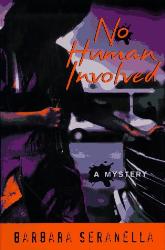
My first book No Human Involved sprung from a story a young murderess told me while we were in custody together. She had killed an old guy she was living with who said he was going to leave her everything in his will. One night she got drunk and impatient and emptied a .22 in his head as he slept. She was pleading temporary insanity. I asked her how she got caught and she said she was drinking in the bar the next day and this guy sidles up next to her and starts buying her drinks. It wasnít too long before she started talking about the murder. It turned out the guy was a homicide cop and came there to arrest her. I wondered what kind of cop would drink with a felon before arresting her. I thought of cops Iíd known, and suspicious conversations Iíd had around closing time at some of the biker dives I used to frequent, and then, because I wanted St. John to be a sympathetic character, I gave him a lot of my husbandís qualities. My husband is extremely good at sizing people up, which is a good quality for a detective. He also had a real blind spot to his beloved fatherís failing mental capabilities, which made him endearing.
|
Ali: | Have any of your old friends from the biker community read any of your work?
|
Barbara: | A few of the women, none of the men as far as I know. I once had a tattooed, leather-wearing, long-haired bearded biker come to a signing. The other two authors took one look at the guy as he made his way towards us and said, ďItís for you.Ē Turns out the guy didnít know me, he just dug the books. He said I did really good research.
|
Ali: | Can you tell us how your debut novel No Human Involved was picked up for publication?
|
Barbara: | After I finished it, I attended a writing conference. I met an agent who had read the first nine pages. She asked for more. She sold it within a month.
|
Ali: | What was it like to get nominated for Deadly Pleasures Barry Award for your first book?
|
Barbara: | It was very nice. So many people had filled my head with expectations of an Edgar nomination, that when I didnít make the cut, I was very depressed. George Easter and Russ Isabella continue to be good friends and supporters and I always wait with bated breath for their reviews of my work.
|
Ali: | How much do you put down their popularity to Mancini as a character? And can you tell us if that makes it harder or easier to write a plot around a character?
|
Barbara: | The biggest hurdle of each new book is finding a premise whereby Munch organically stays involved with the investigation. So the story has to involve her personally, yet not be a rewrite of previous books. I mine the characters of past books, especially the children who are now becoming teenagers. Iím very interested in exploring what sort of adults these children of junkies, bikers, and lowlifes become.
|
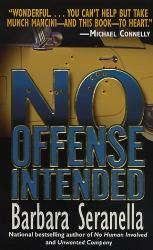
Ali: | How difficult was it to follow-up your critically acclaimed debut with No Offense Intended?
|
Barbara: | I was nervous. Praise can be very paralysing. You ask yourself what you did right and worry that you will disappoint. If I had it to do over again, I wouldnít rush through the ending of that book. But itís still one of my babies, and Iím very proud of it.
|
|
Ali: | We had four further books and now your new book Unwilling Accomplice is your seventh. As your books are not frightened to face up to some of the harsher realities that make life what it is, do you have any problems dealing with the grit in life?
|
Barbara: | It all seems to be what I am compelled to write. I tried writing a lighter, funny book with different characters. But then the lead woman of that book began sounding and acting suspiciously like Munch, so I abandoned the project.
|
Ali: | All your titles are distinctive and I wondered how that came about?
|
Barbara: | I guess I was branding myself. Now my editors and agent are complaining that they get the books confused, so Iíve titled the next book in the series The Last Choice. My agent wants to call it Undead but I told her absolutely not. That sounds like a vampire novel.
|
Ali: | Tell us a little about your approach to the writing process.
|
Barbara: | I begin with premise and then I see where it takes me. I usually donít know what the plot will be until Iím a third of the way through. At the halfway point, I stop and look at the story from the viewpoint of each of the characters. Then I clearly define what they want, what they did, and what they know. This clarifies things quite a bit for me and ensures that each time these characters are in a scene, they are consistent. I donít know the ending until I write it. I just finished a book, and when I worked on the big climatic ending where everyone comes together and all is revealed, my heart was beating fast.
|
Ali: | Which of your books did you find the most difficult to write? And which was the most rewarding?
|
Barbara: |
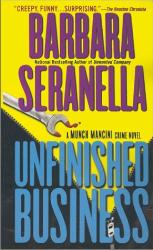
Unfinished Business was very difficult. It was about rape and I relived some stuff that kept me up at night. I wrote a chapter one night about the memories and regrets that passed through Munchís head at 3:30 in the morning when her head wouldnít let her body rest.
Every time I finish a manuscript, Iím in awe that I completed it. Each and every one is rewarding in its own way. Please donít make me choose.
|
Ali: | Iíve heard that you are currently working on a stand-alone.
|
Barbara: | Rumours and lies. Iím not done with Munch.
|
Ali: | Have you any news on having your books published in the UK?
|
Barbara: | Actually, they are already. By Robert Hale. All but the first book, unfortunately. So far they are in hardcover, but I believe he is coming out with a line of mass-market paperbacks.
|
Ali: | Of the more recent crime/mystery books published, which have you enjoyed most?
|
Barbara: | The No. 1 Ladies Detective Agency books. Harry Potter. George Pelecanos. I judged the Edgars this year in the best first category, which seriously cut into my pleasure reading. Dynamite Road by Andrew Klaven was very good. So was Steve Cannellís newest, Vertical Coffin.
|
Ali: | Weíve heard that your series is in development with NBC currently. Can you give us some background on this and an update?
|
Barbara: | Weíre in negotiations. The pilot has been plotted and discussed. Iíve been invited to write on the show, which should be very interesting and fun. But like everything else, nothing happens until it happens. It doesnít hurt to have Stephen J. Cannell producing and pitching the project. All it takes is one eight-hundred pound gorilla in your corner. God bless Steve Cannell.
|
Ali: | We hear that you spend a lot of time with young offenders as well as doing community work. Do you feel a duty to help others who fell into the traps that you did as a youngster?
|
Barbara: | A duty, a privilege, a reminder to myself. When I was out there, screwing up, a lot of people tried to talk to me. I always acted hostile and rebellious, but really I heard every word and those words helped me when I needed them.
|
Ali: | I hear that youíve got close to your parents again. How do they view your success as a writer?
|
Barbara: | They are very thrilled and supportive. Although it is difficult for them to read some of my work.
|
Ali: | Barbara, Thank you for your time and we look forward to Unwilling Accomplice.
|
Barbara: | Thank you!
|


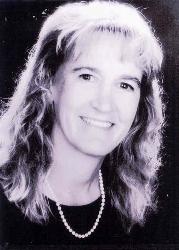 Like George Pelecanos, Barbara Seranella has really lived a life. She draws upon her former past to carve out her work, which now reaches her seventh book Unwilling Accomplice. Her books feature the adventures of the motor mechanic with a chequered past, Munch Mancini. We are first introduced to her in No Human Involved where she becomes a suspect in the death of her abusive father, while fleeing her past in Venice Beach and the shadow of the heroin needle.
Like George Pelecanos, Barbara Seranella has really lived a life. She draws upon her former past to carve out her work, which now reaches her seventh book Unwilling Accomplice. Her books feature the adventures of the motor mechanic with a chequered past, Munch Mancini. We are first introduced to her in No Human Involved where she becomes a suspect in the death of her abusive father, while fleeing her past in Venice Beach and the shadow of the heroin needle.


